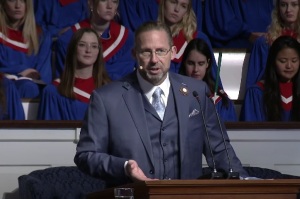Justin Bieber criticizes celebrity pastors who place themselves on a 'pedestal'

Justin Bieber weighed in on "celebrity pastor" culture and criticized those who use religion and their platform to boost their own fame, stressing that every human being, regardless of their status, “has the same access to God.”
In a recent interview with GQ magazine, Bieber, who distanced himself from disgraced former Hillsong pastor Carl Lentz after the latter was fired over “leadership issues” and moral failures, including being unfaithful to his wife, weighed in on how he’s seen celebrity worship invade the church.
Without mentioning Lentz by name, Bieber said he’s seen “so many pastors put themselves on this pedestal” in the church, with devastating consequences.
“And it’s basically, church can be surrounded around the man, the pastor, the guy, and it’s like, ‘This guy has this ultimate relationship with God that we all want but we can’t get because we’re not this guy.’ That’s not the reality, though. The reality is, every human being has the same access to God,” Bieber stressed.
The “Peaches” singer, who recently released a Gospel album, shared how Churchome Pastor Judah Smith, who he met when he was 15, always “put our relationship first” and modeled the kind of home life he hopes he and his wife, Hailey Bieber, will have one day.
“It was something I always dreamed of because my family was broken,” Bieber said. “My whole life, I had a broken family. And so I was just attracted to a family that eats dinners together, laughs together, talks together.”
The singer recalled how, after he put an end to all the partying in his early 20s, he turned to Smith, who recently rebaptized both Bieber and his wife and officiated their 2019 wedding, for spiritual guidance. Lentz first baptized Bieber in 2014.
“I came to a place,” Bieber reflected, “where I just was like, ‘God, if you’re real, I need you to help me, because I can’t do this on my own. Like, I’m struggling so hard. Every decision I make is out of my own selfish ego.’ So I’m just like, ‘What is it that you want from me? You put all these desires in my heart for me to sing and perform and to make music—where are these coming from? Why is this in my heart? What do you want me to do with it? What’s the point? What is the point of everything? What is the point of me being on this planet?’”
Bieber said that when he asked for help, he suddenly received certainty: “If God forgives me and He loves me and He set these things in motion, if He put these desires in my heart, then I’m going to trust Him.”
Now, the artist said he strives to live in obedience to what God calls him to do: “It’s just rewarding to be all that you were designed to be. And I believe that, at this point in my life, I’m right where I’m supposed to be, doing what I believe that God wants me to do. And there’s nothing more fulfilling,” he said.
Prior to his public downfall, Lentz was one of the most well-known evangelical pastors in the U.S. The pastor of Hillsong NYC, Lentz's church was attended by a slew of celebrities, such as Selena Gomez, Kevin Durant, Chris Pratt and the Jenner sisters.
Hillsong founding Pastor Brian Houston later told church leaders and top donors that Lentz, who has three children with his wife, Laura, who he married in 2003, had “more than one affair” before his eventual firing.
The affairs were “significant,” Houston reportedly said, adding that Lentz had a history of “bad moral behavior.” Lentz subsequently blamed his fall on his failure at “protecting my own spirit, refilling my own soul and reaching out for the readily available help that is available” in a Nov. 5 post on Instagram.
Lentz is not the only high-profile Christian leader to fall from grace in recent months. Earlier this year, legendary apologist Ravi Zacharias was exposed for committing years of abuse, sexual misconduct, and other predatory behavior.
Consistently, the moral failures and public collapse of Christian celebrities are met with shock and disbelief from many in the Christian community.
Pastor and author Tim Keller — who acknowledged that he, too, is viewed as a “celebrity pastor” in some circles — told The Christian Post that the problem of idolizing ministers — and then feeling dismayed when they fall from their pedestal — is nothing new.
“It’s a very old problem,” the 70-year-old Hope in Times of Fearauthor said.
But in recent years, celebrity culture has “accentuated” the problem, Keller added: “Social media, in some ways, makes everybody a celebrity. Everybody's a little bit of a celebrity, and the big celebrities have to manage their brand or their image like never before. It’s a real problem,” he explained.
Pastors, however, have a “responsibility that goes way beyond the average person,” Keller said. He cited Psalm 69:6, which says, “Lord, may those who hope in you not be disgraced because of me….may those who seek you not be put to shame because of me.”
“I realize that with my platform — I hate that word — a lot of Christians can be put to shame because of me,” he contended. “And therefore, if God gives me a bigger ‘platform,’ then I actually have a responsibility to not disappoint people. Not to just look like a great person; I actually have to be holy; I have to actually mortify my sin. I have to have a prayer life. I have to do the stuff that every Christian needs to do. I don't have to be better than other Christians, I just need to be what God wants a Christian to be.”
When pastors get to be “well-known,” he said, the praise can turn their heads, the criticism can prompt self-pity, and the overwork can cause them to neglect their prayer life.
“For all those reasons, very often, so-called ‘celebrity ministers and figures’ very often live lives less consistent with the Christian faith than Christians who are not so famous,” Keller said.
“It's the job of the so-called ‘famous Christians’ to just live ordinary, good Christian lives, and not overwork and burn out and get filled with self-pity and anger over all the people that are criticizing them. That’s the thing that sets them up for these things where they embezzle money, they have affairs or they do things like that.”
While Christian leaders who have “not been faithful or responsible with the platform God has given them” must be held accountable, Keller stressed their moral failure “doesn't mean that the Christian faith doesn't work.”
“A quack doctor doesn't mean that medicine is illegitimate. A quack evangelist doesn't mean that the Gospel isn't true. So on one hand, don’t make excuses for your heroes. On the other hand, it doesn’t mean that everything they’ve ever said is illegitimate,” he said.





























